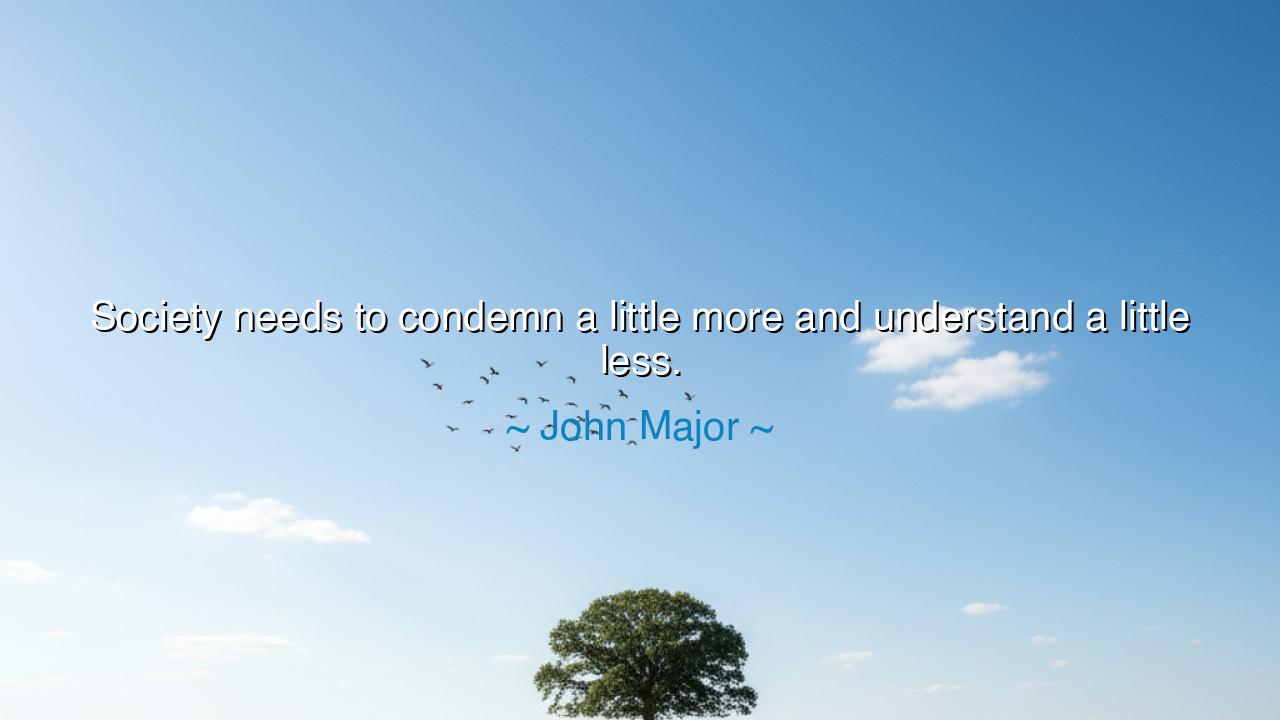
Society needs to condemn a little more and understand a little






Listen well, O children, for I bring you the words of John Major, whose wisdom calls us to reflect on the balance between understanding and condemnation. He said, "Society needs to condemn a little more and understand a little less." At first, these words may seem harsh, even controversial, but they carry with them a deep truth that calls us to confront the moral fabric of the world we live in. Major challenges us to consider that in our pursuit of compassion, we have at times lost sight of the importance of moral clarity, of the need for judgment in a world that is often blinded by too much understanding.
What, O children, does it mean to say that society needs to condemn a little more? It is to recognize that while empathy and understanding are vital in our interactions with others, there must be a line—a point at which certain actions, certain behaviors, cannot simply be tolerated or excused. There are things in this world—acts of injustice, violence, or cruelty—that demand a firm moral response, a society that will not bend in the face of wrong. The idea is not that we should abandon compassion, but that we must remember that morality is not simply about trying to understand the reasons behind bad actions, but about recognizing when those actions must be condemned. In this sense, society must not shy away from passing judgment when evil rears its head.
Consider, O children, the ancient Greeks, who believed deeply in the power of justice and morality. In the courts of Athens, citizens were called to weigh matters not just with compassion, but with a clear sense of right and wrong. Socrates, the great philosopher, was sentenced to death not because the people did not understand him, but because they understood that his teachings challenged the moral fabric of their society in ways that were deemed dangerous. In this trial, the people of Athens showed us that condemnation of wrong actions, when those actions threaten the well-being of society, is not only just, but necessary for the preservation of the state. Their judgment was not out of malice, but out of a sense of moral duty—a sense that is, sadly, often absent in the soft understanding that pervades much of our world today.
In more recent times, O children, we can look to the Nuremberg Trials, where the leaders of the Nazi regime were brought to justice for their roles in the atrocities of World War II. The world had to face the fact that the Nazi regime, with its ideology of hatred and violence, was not something that could simply be understood, but something that had to be condemned in the strongest terms. The crimes committed were so egregious, so vast in their scope, that they demanded a firm response, one that did not seek to understand the perpetrators’ actions, but to hold them accountable for the destruction they had caused. The Nuremberg Trials were not about understanding why such evil had taken place, but about ensuring that those who committed these crimes could not escape the moral judgment of the world. They teach us that there are times when understanding must be set aside in favor of moral clarity and justice.
Now, O children, let us return to our own lives. Today, we live in a world where understanding is often seen as the highest virtue, where we are encouraged to empathize with those who commit harm, to search for the circumstances that may explain their actions. Yet, we must ask ourselves: when does this endless quest for understanding enable wrong? When do we allow evil to persist simply because we cannot bring ourselves to condemn it clearly and firmly? If we are too lenient, too understanding, do we not become complicit in allowing the wrong to continue? This is the challenge of John Major’s words: that we must not shy away from our responsibility to condemn wrongdoing, not just out of a sense of anger, but out of a commitment to justice and moral clarity.
The lesson, O children, is this: while we must always strive to understand the world and the people in it, there are moments when condemnation is necessary. We must not be afraid to speak out against injustice, to call evil by its name, and to uphold the standards of decency and righteousness that form the foundation of any just society. Society cannot thrive if it is unwilling to make moral judgments, to stand firm against what is wrong, and to condemn actions that undermine the dignity of human life. Major’s words remind us that the pursuit of understanding should never be an excuse for inaction or moral weakness.
Therefore, O children, I urge you to be wise in your judgments. Understand that understanding is a powerful tool, but it must be balanced with a commitment to justice. When you face wrong, do not be afraid to speak up, to condemn what must be condemned, and to stand for truth. The world needs people who will not shy away from moral responsibility, but who will face the harsh truths with strength and clarity. In doing so, you will help to build a society that is not just tolerant, but just, a society where the principles of moral integrity are upheld and where evil is met with the judgment it deserves. Condemn what harms, understand what heals, and walk the path of truth.






AAdministratorAdministrator
Welcome, honored guests. Please leave a comment, we will respond soon